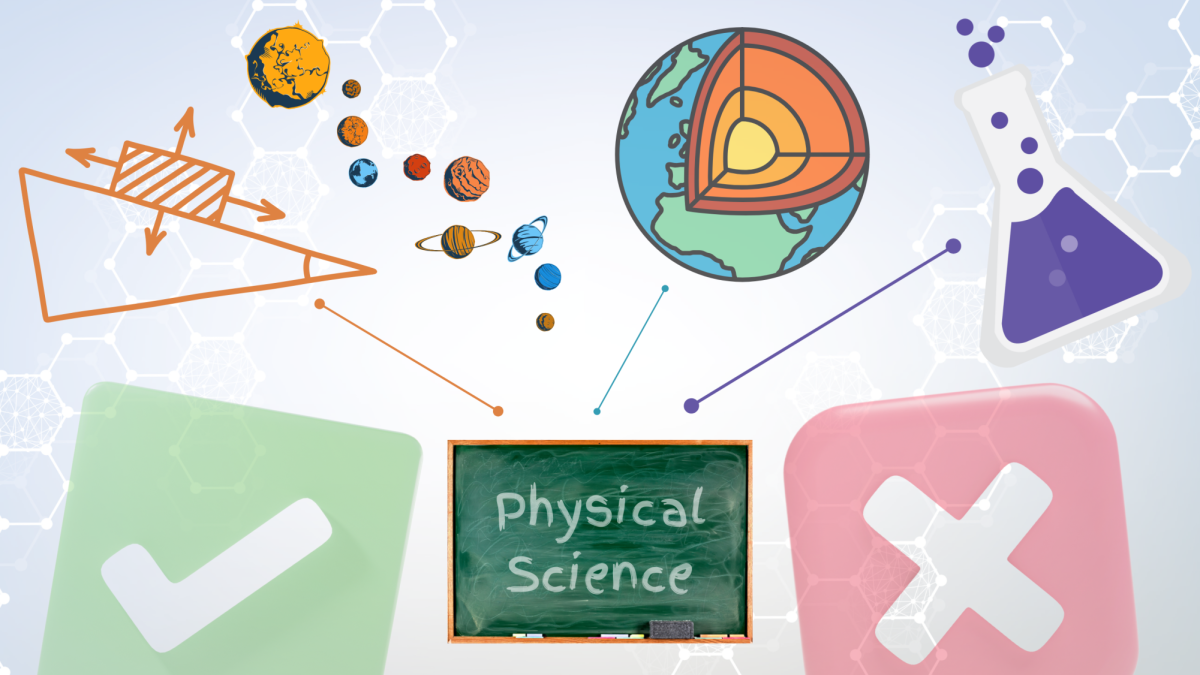Physical Science, coming with CP and Honors options, is the standard option for a freshman science class. Editor-In-Chief Peter Philpott and Asst. Opinions Editor Elise Dougherty sat down to debate its value as the class almost all ninth graders take.
Elise Dougherty: I took Physical Science Honors (PSH) last year, and it was one of the most stressful experiences of my life. Everything we learned seemed completely unnecessary, and I was constantly attempting to wrap my head around concepts that didn’t make any sense. However, the worst part about this class wasn’t the curriculum itself, it’s the fact that it doesn’t count for a lab credit. Looking at my four-year schedule for high school, I am unable to take science electives in my senior year unless I double up on science credits. Because PSH doesn’t count as a lab credit, many students’ choices of classes become limited as they get older and have to think about colleges.
Peter Philpott: I agree it’s a challenge, and it’s a shame it’s not a lab credit. But you can get those credits through the big three sciences (Chemistry, Biology, and Physics), along with Environmental Science, Anatomy, and Engineering Physics classes. Those classes provide meaningful lab time, but I think most freshmen haven’t matured enough to conduct them to their full value; for example, chem’s bunsen burner labs, bio’s dissections, and others become so much more beneficial in a lab course when taken later in high school.
Dougherty: I agree with how you could think that freshmen wouldn’t be mature enough for certain labs, but my friends that go to other schools took Biology their freshmen year and didn’t have any struggles. I am taking biology this year as a sophomore, and it is an extremely light courseload. I think that PSH was too intense for freshmen, and Biology would’ve been a more gentle start to my high school science experience. PSH teacher Kenadi Dixon explained that Biology also might make more sense as a freshman class, especially since so few high schools in the district have Physical Science (PS) classes. “This would help streamline course progression across schools, especially when students transfer to our high school from others,” Dixon said.
Philpott: But the best part about PS is that it is so catch-all – it’s a class that explores so many sciences, from physics to chemistry to earth science (almost everything except for biology), and that means it allows students to sample so many different focuses. This class structure pushes young students to find a passion, the best thing for a freshman class to do, and I believe it drives more people into niche sciences or more to take science electives later on in high school. For me, it was my PS class that got me interested in chemistry, drove me to challenge myself in Chem Honors, and now take AP Chem as a senior next year. I bet that almost no freshmen would develop a passion for astronomy, geology, or science history without the sample units PS provides. That’s really valuable to me.
Dougherty: Although I get the appeal of a survey class, and I see how the topics explored in PS can prompt freshmen to discover new passions, I think the topics covered in PS are too complicated for some students. Because of this, students may fall off the honors track because this class is too intense. I, along with a couple of my friends, had to drop down to CP science classes our sophomore year because we didn’t feel prepared for Honors Chem, which is the recommended track. Other students might see their friends struggling in PSH and decide that an honors science class might not be suitable for them, so they never get on the honors track.
Philpott: I think that it still stands that PS is perfect for academic and self-discovery. Finding passion is one benefit, but in such an academically rigorous environment, like Creek’s top tier science program, it’s good to find out early that the honors track is too much. It’s better to absorb information in a class where you can understand and keep up with the workload and difficulty than be behind and struggle more than enjoy the course.
It’s best to learn early on whether the challenging honors track is best for you. I’d rather learn that in a freshman survey than a challenging Chem course later on. If it is, then it’s a great prep course – “[The] Physical Science course addresses [Colorado’s new science standards] in a way that ensures our students are ready for their sophomore year course at Creek,” according to science department coordinator Stephen Smith.
Many can still be admitted to college even without the most challenging courses – if you succeed where you academically fit in, it’s a lot better for your transcript than failing where you don’t.
Dougherty: I completely agree that PS does a good job introducing topics that students wouldn’t usually get exposure to and helps students manage the course load of different classes. I just think this academic discovery can be done through courses that set students up for their graduation credits. If other schools start their science tracks with Bio, and it works for the students, Creek shouldn’t have to do something different.
Philpott: In the end, PS could be helpful for students futures if students are interested in a diverse structure that explores many topics. But I agree, some could benefit from starting with Chem or Bio. But I don’t think Creek will change the structure anytime soon, and I enjoyed the sense of discovery and diversity PS brought for me.









